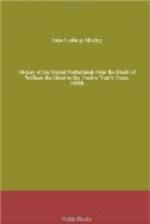The reasons were unanswerable for the refusal of the States to bind themselves to a foreign sovereign in regard to the interior administration of their commonwealth; but that diversity of religious worship should be considered incompatible with the health of the young republic—that the men who had so bravely fought the Spanish Inquisition should now claim their own right of inquisition into the human conscience—this was almost enough to create despair as to the possibility of the world’s progress. The seed of intellectual advancement is slow in ripening, and it is almost invariably the case that the generation which plants—often but half conscious of the mightiness of its work—is not the generation which reaps the harvest. But all mankind at last inherits what is sown in the blood and tears of a few. That Government, whether regal or democratic, should dare to thrust itself between man and his Maker—that the State, not with interfering in a thousand superfluous ways with the freedom of individual human action in the business of life, should combine with the Church to reduce human thought to slavery in regard to the sacred interests of eternity, was one day to be esteemed a blasphemous presumption in lands which deserved to call themselves free. But that hour had not yet come.
“If the garrisons should be weakened,” said the prince, “nothing could be expected from the political fidelity of the town populations in question, unless they should be allowed the exercise of their own religion. But the States could hardly be disposed to grant this voluntarily, for fear of injuring the general insecurity and violating the laws of the commonwealth, built as it is upon a foundation which cannot suffer this diversity in the public exercise of religion. Already,” continued Maurice, “there are the seeds of dissension in the provinces and in the cities, sure to ripen in the idleness and repose of peace to an open division. This would give the enemy a means of intriguing with and corrupting those who are already wickedly inclined.”
Thus in the year 1608, the head of the Dutch republic, the son of William the Silent, seemed to express himself in favour of continuing a horrible war, not to maintain the political independence of his country, but to prevent Catholics from acquiring the right of publicly worshipping God according to the dictates of their conscience.
Yet it would be unjust to the prince, whose patriotism was as pure and unsullied as his sword, to confound his motives with his end. He was firmly convinced that liberty of religious worship, to be acquired during the truce, would inevitably cause the United Provinces to fall once more under the Spanish yoke. The French ambassador, with whom he conferred every day, never doubted his sincerity. Gelderland, Friesland, Overyssel, Groningen, and Utrecht, five provinces out of the united seven, the prince declared to be chiefly inhabited by Catholics. They had only entered




